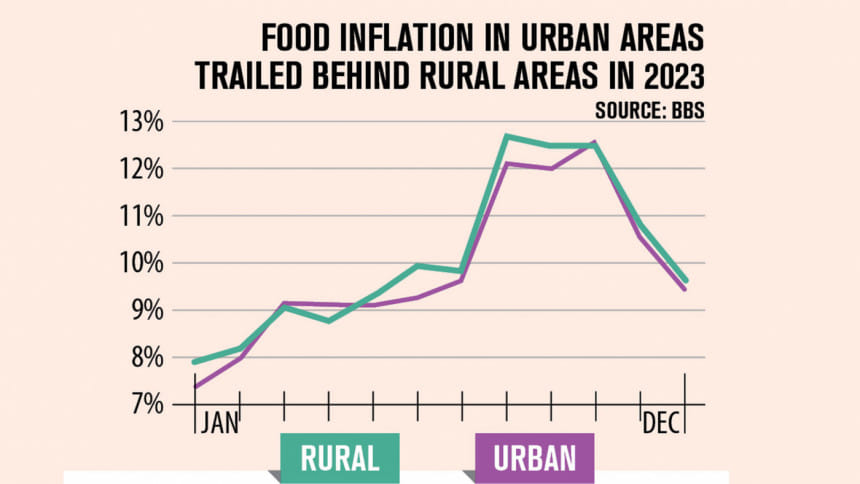Who’s to blame for vegetable price spiral?

Day labourer Azizul Haque was upset to see the price of papaya when he went to do grocery shopping yesterday: it has doubled in a space of a few days.
"Due to the rise in vegetable prices, papaya was the only one I could afford. At this rate, we won't be able to afford any vegetables soon," said a crestfallen Azizul, who lives in Dhaka's Mirpur-14 with his family.
Despite being the peak season, the papaya now costs Tk 30-50 a kg in Dhaka's kitchen markets.
Yet, the farmers in Manikganj who grow the papaya are getting barely half that price, putting the spotlight on the dysfunctional supply chain that is compounding the cost of living crisis the low-income group is grappling with for more than a year now.
One such farmer is Monir Hossain, who cultivated carrots, papayas, coriander and radishes on his 185-decimal land in Manikganj.
He sold the carrots for Tk 13 per kg, papayas for Tk 17 a kg, coriander for Tk 25 a kg and radishes for Tk 12 kg to a middleman at Chiding Char in Manikganj's Singair upazila.
Monir made a profit of Tk 1.38 lakh against his investment of Tk 3 lakh for harvesting the winter crops.
"With this profit, I am still struggling to run my family. If anyone in my family falls ill, I have to take a loan."
And if he factors in the labour put in by himself, his wife and son, his profit of Tk 1.38 lakh seems "very little", said Monir, who sold his produce to Abdur Razzak.
Razzak brought Monir's fresh produce to Dhaka's Karwan Bazar wholesale market, where he sold the carrots for an average of Tk 18 per kg, the papayas for Tk 22 a kg, the coriander for Tk 30 a kg and the radishes for Tk 16 a kg to wholesalers.
The wholesalers sell the produce to vegetable sellers, who then sell it to the end customers.
Carrots, on average, were sold for Tk 22 per kg, papayas for Tk 24 a kg, coriander for Tk 40 a kg and radishes for Tk 17 a kg to the vegetable sellers in Dhaka's kitchen markets.
In Dhaka's kitchen markets, where as much as 50 percent of the fresh produce sold is grown in adjoining areas such as Munshiganj, Hemayetpur, Jhawchar, Jadhurchar, Boilapur and Ashulia, each kg of carrot is selling for Tk 30-40, papaya for Tk 30-50, coriander for Tk 50-80 and radish for Tk 30-40.
During their transit from the farms to the kitchen markets, the prices of almost all vegetables have doubled or tripled, found the correspondents from their field visits.
"The poor supply chain system is mainly to blame for such a price hike of vegetables and everything else," said Selim Raihan, executive director at the South Asian Network on Economic Modelling.
For want of a well-developed supply chain, communication system and information flows, farmers are selling their produce to middlemen at throwaway prices.
"The middlemen exploit the situation and sell the produce at high prices, for which the urban poor are suffering the most," said Raihan, also a professor at the University of Dhaka's Department of Economics.
Due to the stubbornly high inflation for close to two years now, the poverty-stricken poor and the low-income demographic are making do with less nutritious, low-quality food, which will ultimately trigger health and inter-generational issues in them.
Since March last year, urban inflation stayed above 9 percent and so did food inflation in urban areas, according to data from the Bangladesh Bureau of Statistics.
"I do not see any visible initiatives at the policy level of the government to bring down food inflation and enact a strong market management policy to put an end to the market anomalies," Raihan said.
He called for creating awareness among farmers as well as establishing a well-developed supply chain with rules and regulations on how much extra a middleman can add to the prices of fresh produce.
Whether such a mechanism would suit the middlemen and wholesalers remains up in the air.
Razzak, the middleman from Manikganj, maintains he is within his rights to add an average markup of Tk 5 on each kg of the fresh produce he purchased from the farmer Monir.
"I had to hire labour, I had to hire a truck, I had to pay commission for selling the produce in Kawran Bazar," he said, adding that his average outlay on each kg of the fresh produce is Tk 4.7.
Often, the middlemen have to entertain extortionists on the highways.
Anwar Hossain, a vegetable wholesaler in Kawran Bazar, says he has no option but to add a 15 percent markup on the produce he purchases from middlemen to factor in rot and damage.
The wholesalers also have to pay a sum to the authorities of the kitchen markets where the produce is sold.
"Most of the time, we take capital from the kitchen market authorities to run our trade and we have to pay them a 5 percent interest. If we count everything, we have no option but to sell the produce at a minimum of 15 percent extra to survive," he added.
The vegetable sellers in the kitchen markets also maintain they have no option but to charge the prices that they do.
"We do not even think about the price the farmer sells the produce at," said a vegetable vendor in Mirpur's Shewrapara wishing not to be named.
Their prices are determined by what they pay the wholesalers. They also factor in staff salary, space rent and utility bills.
"If I do not make a profit, how will I run my business and my family?" he said.
The same question is weighing too heavily on the day labourer Azizul's mind.
"My income has not increased in the last couple of years, but the prices of everything have. How will we survive in such a time of skyrocketing prices?"


 For all latest news, follow The Daily Star's Google News channel.
For all latest news, follow The Daily Star's Google News channel. 




Comments